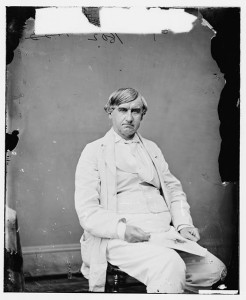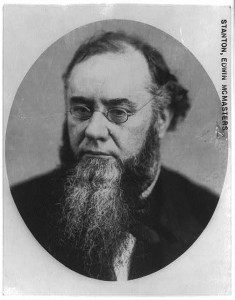In August 1862 Secretary of War Stanton ordered arrests for disloyal practices and the suspension of the writ of habeas corpus in those cases. Here’s how that worked out in practice at least in this case (and to the extent that the Richmond Daily Dispatch is telling it straight). [1]
From the Richmond Daily Dispatch October 18, 1862:
Tyranny at the North–military Vs. Judiciary.
Lincoln and his soldiery are triumphant — that is, over their own Constitutions, laws, and people.–A case in point has just occurred. which we find recorded in the Northern papers. A Mr. Nathaniel Batchelder having been arrested for alleged disloyal practices, a writ of habeas corpus was issued by Judge Bell, Chief Justice of New Hampshire, on the return of which the following was read:
Judge Advocate General’s Office, September 13, 1862.
Hon. J. H. Ela, U. S.Marshal, Rochester, N. H.:
Sir:
Your telegram to the Secretary of War, under date of the 10th inst, relative to the write of habeas corpus, issued in the case of Nathaniel Batchelder, arrested for disloyal practices, has been referred to this office for reply.
The Secretary of War directs me to inform you that, by an order issued under the authority of the President of the United States, a printed copy of which is enclosed, the writ of habeas corpus has been suspended in all cases of arrest for “disloyal practices” to which class of offences that of Nathaniel Batchelder manifestly belongs. The Secretary instructs me to say that to the writ of habeas corpus, issued by Chief Justice Pell (Bell) you should return these facts as your warrant for holding the prisoner in custody. Should any attempt be made, after the return, to release the prisoner by the civil authority, which is not anticipated, the Secretary directs that you appeal for support and protection in the discharge of your duties to the military force of the United States in your vicinity.
Very respectfully, your ob’t servant.
J. Holt, Judge Advocate Gen.
The New Hampshire Patriot reports the decision thus:
After argument by counsel, the Chief Justice said that it seemed to him inexpedient, and useless to the prisoner, to issue an order for an attachment which could not be enforced; that the Government of the United States had plainly expressed its determination to resist by force any attempt of the civil authority to deliver the prisoner, and that he received this not as a threat, but as the announcement of a settled resolution, which, with the vast armies under their control, they had the ability to execute against any power which the State can command for the enforcement of the law. He therefore declined to take further action in the case.
Joseph Holt, who was appointed Judge Advocate General on September 3, 1862, got right to work – in this case he seems to be mostly conveying Secretary Stanton’s decision.
The Davis administration suspended habeas corpus in the Confederacy at various times and places, too.
- [1]10-20-2012: It looks like the Dispatch is telling it as straight as The New-York Times.↩


